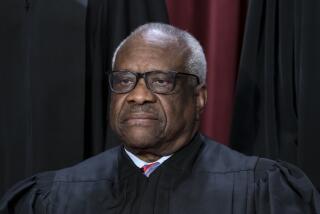Lawyers’ Standards in Free Fall
- Share via
The so-called torture memo that has entered the public light is scandalizing. The document, penned by Jay Bybee -- then head of the Justice Department’s Office of Legal Counsel and now a judge on the U.S. 9th Circuit Court of Appeals -- provides shocking cover for cruel, inhuman and degrading treatment. Since it surfaced last month, liberals have condemned its near recklessness and conservatives its lack of refinement, and the Bush administration has disavowed it.
But to the extent that it’s been defended, the defense has been this: This is what lawyers do. Its authors, the argument goes, weren’t making a value judgment for or against torture but were simply providing objective counsel, exploring how far the law would let the administration go. The client, after all, needs to know the full range of his options, argued John Yoo, one of the lawyers who worked on the memo in the Office of Legal Counsel, and to offer any less would have been irresponsible.
Is that true? Is that what clients should expect from their lawyers?
To some degree it may be. But that doesn’t reflect well-thought-out legal theory so much as today’s lowered standards for lawyers. As a result of the lowering of professional standards by the American bar during the past generation and of the line-blurring between legal and political judgments, what many find deplorable about the torture memo is just one high-profile example of the kind of law that is being practiced today all across the country. Revisions to the lawyers’ code of professional responsibility adopted by the American Bar Assn. and by most states have reduced the standard to this: Lawyers can’t fake evidence, lie to judges, commit crimes or help clients plan, carry out or hide those crimes. And lawyers must follow rules of ethics that are clearly spelled out. Otherwise, as the legal scholar Robert Gordon put it, “they may, and if it will serve their clients’ interests must, exploit any gap, ambiguity, technicality or loophole, any not-obviously-and-totally-implausible interpretation of the law or facts.”
The result is a kind of aggressive lawyering that would not have been tolerated in a previous era. The common examples come from private practice. The endorsement, for example, by the law firm of Vinson & Elkins of Enron’s crooked accounting is a recent disgraceful instance, and it reflects the strain on professional morality caused by pressure from the marketplace.
But there are also well-known examples from the Justice Department itself. An uproar in the Reagan years, for instance, involved the administration fervently promoting tax exemptions for South Carolina’s Bob Jones University and other racially segregated private schools. Responding to a case challenging the practice, conservative Chief Justice Warren Burger wrote the opinion for the 8-1 majority, ruling that “there can no longer be any doubt that racial discrimination in education violates deeply accepted views of elementary justice.” Led by its civil rights chief, William Bradford Reynolds, however, the Reagan Justice Department defended the administration’s position even after the high court rejected it, with Reynolds blaming the loss on the media.
At the Office of the Solicitor General, equal in prestige to the Office of Legal Counsel, the Reagan years brought a new aggressive approach to Supreme Court cases dealing with hot-button social issues like school prayer. In those cases, it was soon understood by the court as well as the Justice Department, the solicitor general functioned as the president’s partisan advisor. His advocacy was employed not in the service of the law’s long-term development (as had traditionally been assumed) but of the administration’s political objectives.
In the Reagan years, when the Justice Department finally went too far, observers of the department among lawyers and academics shamed it into tacking back toward moderation. In a similar sanction, Judge Bybee is now unlikely to ascend to the Supreme Court and Yoo, his former OLC deputy who teaches at UC Berkeley’s law school, is unlikely to be nominated to any court soon.
The outcry in the legal community about the torture memo arose because it didn’t offer the independent counsel, practical wisdom and moral guidance that the best lawyers provide their clients. But it also arose because many lawyers were embarrassed to be reminded that that measure of professionalism isn’t the prevailing standard.
*
Lincoln Caplan is the editor and president of Legal Affairs magazine.
More to Read
Get the L.A. Times Politics newsletter
Deeply reported insights into legislation, politics and policy from Sacramento, Washington and beyond. In your inbox twice per week.
You may occasionally receive promotional content from the Los Angeles Times.









